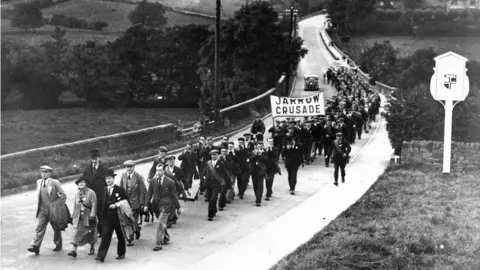Jarrow March project asks walkers to raise food bank funds
 James Lamb
James LambA descendant of a participant in one of England's most famous protest marches is using it to support food banks.
James Lamb's great great grandfather was one of 200 unemployed men who walked to London in 1936 as part of the Jarrow March to demand government help.
Mr Lamb wants people to walk, run or cycle as much of the same 282-mile distance as they can to raise funds.
The 19-year-old from Newcastle said it was "important that people get involved with that history".
It was "one of the things that paved the way for the protest rights that we have now", he said.
The Jarrow March Project, which will continue until the end of October, is primarily intended to support food banks, but any statement it made about the cost of living crisis was "absolutely a huge step forward", he said.
It will culminate at Jarrow Town Hall where those taking part will be invited to walk, as their last mile, the original Jarrow marchers' first mile.
 Getty Images
Getty ImagesJarrow Labour MP Kate Osborne, who will be taking part, said "more and more" people were having to use food banks.
"It is a shocking indictment of this Tory government that we have more food banks than we do branches of McDonalds," she said.
"The government are repeatedly failing our communities, much like they did in 1936 when the original marchers set off from Jarrow carrying their 12,000-strong petition."
The government has blamed rising costs on the war in Ukraine, although other causes have also been identified.
A spokesperson for the Treasury said it had taken "decisive actions to hold down bills" with tax cuts, the Energy Price Guarantee and extra payments of "at least £1,200" for the most vulnerable households.
Mr Lamb said there had been a positive response to his project from people who knew about the Jarrow March and were already interested "in that sort of activism", but it was harder to get the project's "target audience" involved.
The money would be shared out so funds raised by each individual would go to food banks near where they live, he said.

Follow BBC North East & Cumbria on Twitter, Facebook and Instagram. Send your story ideas to [email protected].
